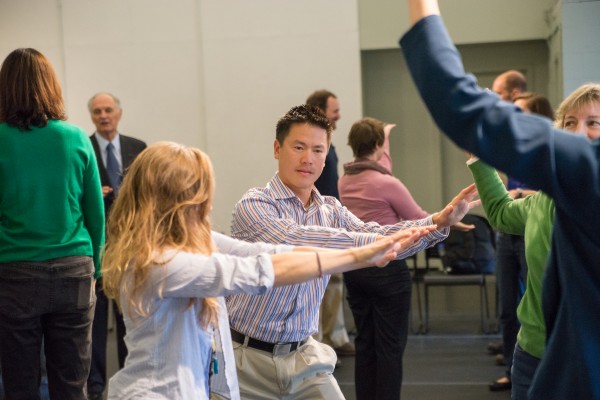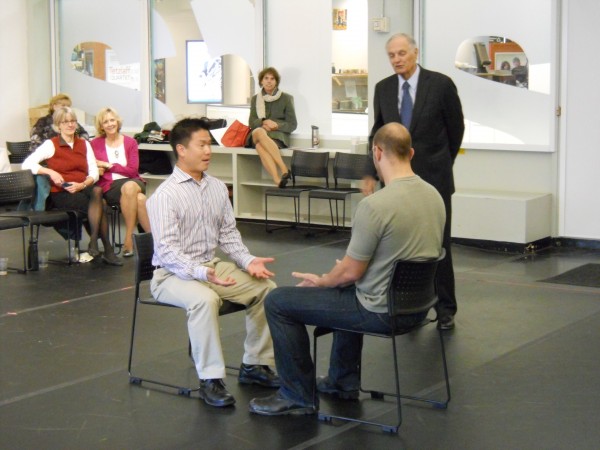3 December 2014
“Yes, And …”: How Improvisational Acting Improves Your Communication Skills
Posted by mcadams

Gifford Wong, center, participates in a theater exercise called “mirror” with students in the Communicating Science course at Dartmouth College. Wong is a co-developer and co-instructor of the course which has students try out a variety of improv exercises. Photo by Eli Burakian, Dartmouth College.
College
By Gifford Wong
The idea is not new – doing improv does improve your ability to communicate. For examples look here, here, and here, or read anything from the wonderful scientist-turned-filmmaker Randy Olson.
While the specific vehicle – improvisational acting – may seem foreign or divergent from the scientific process at first blush, the concept connects the realities of life (life is improvised, after all) with the vagaries of doing science (experiments don’t always go according to plan, right?).
So what exactly is improv? Historically, improv is seen as descended from the centuries-old theatrical form commedia dell’arte, and true improvisational theater is getting on stage and performing with zero preparation. Conceptually, improvisation happens all the time. We improvise every day – life has no script – reacting to our environment and the people around us. Viola Spolin, important innovator of improvisational theater, calls this “accessible intuition.” We all have this “muscle” and the trick is learning how to strengthen it.
I’m currently co-developer and co-instructor of an innovative graduate-level course, Communicating Science, at Dartmouth College designed to teach young scientists how to better communicate their science to the public and each other. The course, a product of an institutional partnership with the Alan Alda Center for Communicating Science at Stony Brook University, pioneers a curriculum that builds on a foundation of improvisational theater concepts and practice.
I am also a PhD candidate in Earth Sciences at Dartmouth College. I study patterns in recent climate using ice core records from Greenland, and I am currently investigating prevailing trends in and correlations between precipitation (snow accumulation) and temperature in northwest Greenland. I have also worked as a science technician, NSF Science Representative, and video voice-over with the Science Coordination Office of the recently completed West Antarctic Ice Sheet Divide Ice Core project.
Between my reflections on the graduate student courses and my own experiences as an improvisational actor and young researcher, I’ve identified three tenets of improv that translate well into the realm of science, engineering, and research. I’ll share these and other observations at this year’s AGU Fall Meeting during the Sharing Science in Plain English panel and lunch:
Make the other person ‘look good’. Believe or not, most improvised scenes are not about securing the laugh or making “a funny.” In fact, being funny is hard, even paralyzing for any beginning improviser. A good scene begins with the realization that the scene’s success (failure) is inextricably bound in how good (bad) an actor can make the other actor(s) look. This stage-born selflessness translates well to the aspiring science-communicator: my responsibility is to make the audience look good, whether during an impromptu elevator pitch, around the in-law’s holiday dinner table, or in front of an eager and field-specific AGU science session. This responsibility emphasizes clear and concise communication so that messages land squarely with audiences – you cannot assume they’ll magically get it.

Alan Alda (standing), for whom the Alan Alda Center for Communicating Science at Stony Brook University is named, instructs Dartmouth graduate students Gifford Wong (seated, left) and Philip Fernandes (seated, right) on a theater exercise called “verbal mirror.” Photo by Dr. Mark McPeek, Dartmouth College.
“Yes, and …” The most bandied about guideline in improvisational comedy is the principle of acceptance: “Yes, and …” Most scenes quickly fizzle if an actor negates or denies his or her partner. Imagine how uninspired Superman would feel if in the middle of, “It’s a bird, it’s a plane, its …” someone feebly said, “No, its just Superman.” In science communication, negation or denial of an audience may come off as disconnected and condescending. Ensuring your message lands with your audience requires constant vigilance and accommodation. Bona fide connection with your audience requires a constant acceptance of both the challenge – “How can I explain this concept in an interesting and meaningful manner?” – and the real-time results – “Am I reaching my audience or are they becoming disengaged?”.
Let yourself fail. On stage, a “failed” scene is quickly washed away by the next. The uncomfortable awkwardness becomes comfortable again, and you’re left with lessons that can be applied in subsequent scenes. Yes, this is hard to do publically on stage, but we as scientists also fail all the time. Failed experiments, failed hypotheses, failed explanations. Failing does not make you a failure, however; it is an opportunity to start again, just like on stage. When I think of all the scientists and engineers who have influenced my view of the world, I am not explicitly aware of their failures, only the successes that have come as a result of failing perhaps many times before.
The philosophy of improvisation, whether practiced on stage or in the kitchen cooking, is a helpful model for creating something from nothing. Merely presenting results and findings outlined in the scientific method doesn’t guarantee a connection with an audience: it needs to be created. Improvisational theater is an accessible way for young scientists and researchers to practice connecting with their audiences.
Want to give it a try? In addition to Stony Brook University and Dartmouth College, go here or here to learn more about improv and local opportunities.
— Gifford Wong is currently a Ph.D. candidate, IGERT Fellow, and GK-12 Fellow at Dartmouth College after having spent nearly a decade fighting wildland fires “out West” and working as a helicopter technician in Antarctica. Wong will be speaking on the Sharing Science in Plain English (Panel & Lunch) panel on Thu., Dec. 18, at the 2014 Fall Meeting. Wong will also be speaking in The Role of Scientists as Communicators: From the Classroom to the Pub education session on Fri., Dec. 19.


 The Plainspoken Scientist is the science communication blog of AGU’s Sharing Science program. With this blog, we wish to showcase creative and effective science communication via multiple mediums and modes.
The Plainspoken Scientist is the science communication blog of AGU’s Sharing Science program. With this blog, we wish to showcase creative and effective science communication via multiple mediums and modes.
Gifford, I think improve is a fantastic learning experience for all communicators! Recently, I was fortunate enough to attend a presentation by NRAO Public Information Officer, Charles Blue. Charles talked a lot about his experience in stand up comedy and how important humor and relating to the audience were in speaking about science to the general public. Charles was able to take incredibly dense radio telescope jargon and turn it into an entertaining and informative presentation. This type of connection with an audience is crucial in science communication!